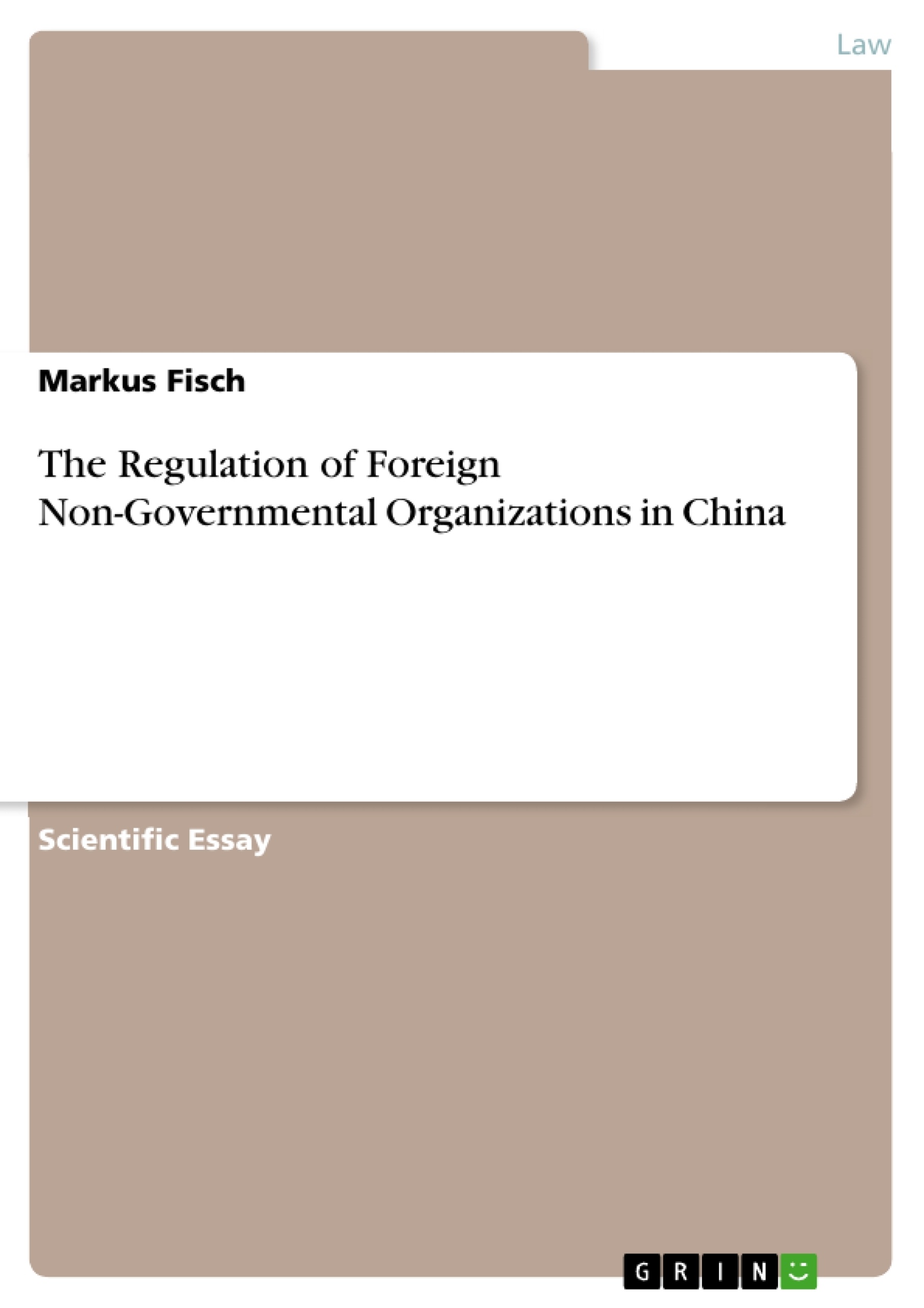The present article is devoted to China's first Law on the Management Of Foreign Non-Governmental Organizations' Activities within Mainland China which will enter into force on 1 January 2017. The reform plans of the Chinese government have caused a great echo abroad, since the new law will have a significant impact on the activities of foreign NGOs in mainland China. In future, they will have to choose between two forms of activities, either to establish a representative office or to carry out temporary activities. However, both cases require a registration process with the authorities of Public Security as part of the new comprehensive monitoring and controlling system.
At first, the article illuminates the historical and political background of foreign NGOs and their activities in China. Then, a brief overview of the current legal framework, under which foreign NGOs in China are entitled to act, is given. The focus lies on the analysis of the new legislation, in particular, the registration procedure for both forms of activities, followed by a closer view on special provisions to be observed after a successful registration, and a discussion of the regulatory powers in case of a violation of the legal provisions.
Inhaltsverzeichnis (Table of Contents)
- Introduction
- Backgrounds of the NGOL
- Current legal framework for NGOs
- Structure and content of the NGOL
- Structure of the NGOL
- Definition und activity fields of foreign NGOs
- Activity forms of foreign NGOs
- Jurisdiction of the regulatory authorities
- Registration and establishment of representative offices in China
- Requirements and procedure
- Expected consequences of the required registration for practice
- Temporary activities of foreign NGOs
- Special provisions
- Reporting
- Funding
- Recruitment of staff
- Membership in foreign NGOs
- Powers of authorities for infringements
- Conclusion
Zielsetzung und Themenschwerpunkte (Objectives and Key Themes)
This article focuses on the new Law on the Management of Foreign Non-Governmental Organizations' Activities within Mainland China (NGOL), which entered into force on 1 January 2017. The law aims to regulate the activities of foreign NGOs in China and promote exchanges and cooperation while safeguarding their lawful rights and interests. The NGOL introduces a comprehensive monitoring and controlling system, requiring foreign NGOs to choose between establishing a representative office or carrying out temporary activities, both of which require registration with the Public Security authorities.
- The historical and political background of foreign NGOs in China
- The current legal framework governing foreign NGOs in China
- The structure and content of the NGOL, including the registration process and special provisions
- The regulatory powers of the Public Security authorities in case of legal violations
- The impact of the NGOL on the activities of foreign NGOs in China
Zusammenfassung der Kapitel (Chapter Summaries)
- Introduction: This chapter provides an overview of the NGOL and its significance for foreign NGOs operating in China. It highlights the strict registration and monitoring regime imposed by the law and explores the reasons behind the Chinese government's decision to regulate foreign NGOs more stringently.
- Backgrounds of the NGOL: This chapter examines the historical and political context surrounding the enactment of the NGOL. It discusses the perceived threats posed by foreign NGOs to the Chinese government's ideology and the strengthening of the Chinese control and monitoring apparatus.
- Current legal framework for NGOs: This chapter outlines the existing legal framework for NGOs in China, including the three organizational forms recognized by law: social associations, civil non-enterprise institutions, and foundations. It also highlights the existence of informal NGOs operating in a legal gray area.
- Structure and content of the NGOL: This chapter provides a detailed analysis of the NGOL's structure and content. It examines the registration requirements for foreign NGOs, including the establishment of representative offices and the conduct of temporary activities. It also discusses special provisions regarding reporting, funding, and recruitment of staff.
Schlüsselwörter (Keywords)
The NGOL, foreign NGOs, China, registration, monitoring, Public Security, representative offices, temporary activities, legal framework, regulatory powers, civil society, ideology, control and monitoring, rule of law, transparency.
Frequently Asked Questions
What is the China Foreign NGO Law (NGOL)?
The NGOL is China's first law specifically managing the activities of foreign non-governmental organizations within mainland China, effective from January 1, 2017.
What are the two legal forms of activity for foreign NGOs in China?
Foreign NGOs must either establish a permanent representative office or carry out temporary activities in cooperation with a Chinese partner.
Which authority is responsible for the registration of foreign NGOs?
Under the new law, the Public Security authorities are responsible for the registration, monitoring, and control of foreign NGO activities.
What special provisions must registered NGOs observe?
The law includes strict regulations regarding annual reporting, funding sources, staff recruitment, and membership policies.
What happens if a foreign NGO violates the NGOL?
The law grants regulatory authorities extensive powers to investigate infringements and impose sanctions or bans on organizations that violate the provisions.
- Arbeit zitieren
- Markus Fisch (Autor:in), 2017, The Regulation of Foreign Non-Governmental Organizations in China, München, GRIN Verlag, https://www.grin.com/document/358066



